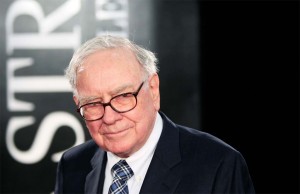
Warren Buffett's purchase of the Van Tuyl Group may signal a consolidation of dealerships across the U.S.
Billionaire investor Warren Buffett has purchased the fifth-largest auto dealer network in the U.S. and plans to push for a consolidation of the retail auto business – a move many automakers are likely to support as it could help curb the profit-cutting incentives that have long been an industry norm.
Buffett’s Berkshire Hathaway investment arm will take over the Van Tuyl Group, which operates showrooms across the U.S. – selling about 240,000 vehicles annually. While a price tag wasn’t disclosed, the company’s operations are believed to generate about $8 billion in annual sales.
But Buffett’s new Berkshire Hathaway Automotive unit is expected to push beyond retailing to also offer financing and other services. And it is indicating it will also look to snap up other family-owned automotive dealerships.
There already has been a substantial consolidation in the retail side of the car business, a trend that accelerated during the recent recession when Detroit’s bankrupt General Motors abandoned four of its brands and both GM and Chrysler used Chapter 11 protection to break their franchise agreements with a number of long-time retailers.
In its early days, the industry believed that having a large network of dealers was a way to dominate the market. That position has reversed itself in recent years, largely due to the success of import makers, such as Toyota and Mercedes-Benz, who have limited their retail networks to bump up both exclusivity and profitability.
Manufacturers have come to realize that by blanketing a metro area with too many dealers they wound up competing with themselves, rather than the competition. That often leads to higher incentives and bigger discounts.
“We’re certainly thinking big and would like to grow the business,” Jeff Rachor, president of Van Tuyl, told the Wall Street Journal. He will now serve as Berkshire Hathaway Automotive’s chief executive. He told the publication there are 5,000 U.S. dealerships that could be targets of acquisition – about a quarter of the current U.S. franchised dealer total.
(Buffett sells shares in GM despite “low price.” For more, Click Here.)
The 60-year-old Phoenix dealer chain had been run by Larry Van Tuyl, son of the founder. He will now serve as Berkshire Hathaway Automotive’s chairman.
(Click Here for details on GM’s less is more philosophy.)
The move comes at a critical time for the auto industry. Not only has there been a push to reduce the total number of retailers, but also traditional brick-and-mortar stores are facing other challenges. So far, protective state franchise laws have blocked efforts to directly sell cars online, much like shoes, TVs and other consumer goods. But online information services have made it easier for car shoppers to haggle for the best deal.
Meanwhile, industry upstart Tesla Motors has challenged those laws in a number of states – so far to mixed results – hoping to eliminate the middleman by operating factory-owned showrooms.
(To see more from the Paris Motor Show, Click Here.)
But the concept of corporate-run dealer networks has gained increasing acceptance by manufacturers such as Ford, GM and Toyota that originally tried to block the creation of such publicly traded entities as Florida-based AutoNation. Still, industry data suggest such groups still account for just 8% of total U.S. auto retail sales.
The purchase of the Van Tuyl Group is just the latest foray into the automotive world by Buffett, who currently owns a 2.1% stake in GM, while also holding a stake in China’s battery-carmaker BYD.

Monopolies are never good for consumers. Based on financial reports the auto makers have very healthy profit margins.